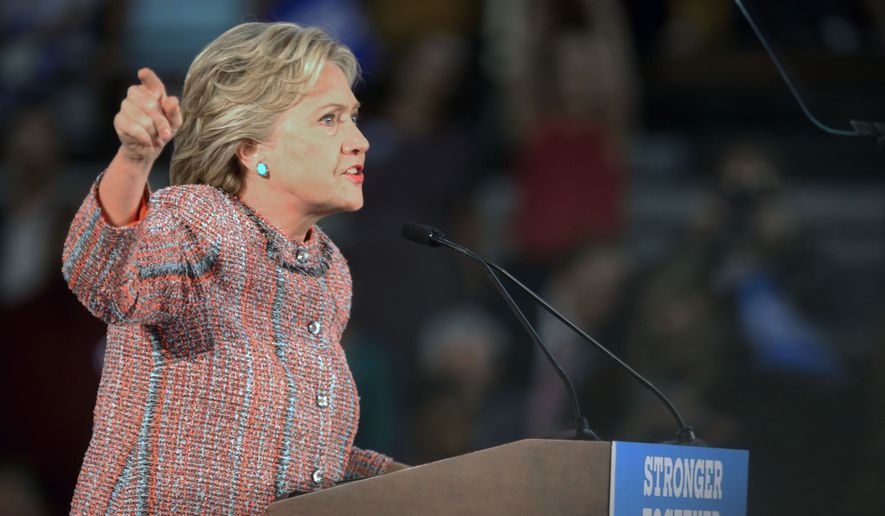OPINION:
In the second presidential debate, Hillary Clinton once again failed to mention one of the biggest problems facing America — the fact that our businesses cannot compete with the rest of the world. Because the U.S. tax code has not been updated for three decades, American businesses today face the highest rates in the world and are subject to a complex system of double taxation.
This outdated system has forced almost 50 American businesses to leave the country through an inversion during the past decade. Over the same period, we have had a net loss of $179 billion in assets in the global market, according to a report by Ernst and Young. In all, our outdated code has cost us as much as $800 billion in assets and 1,300 companies in the past decade. This problem will only get worse, as other countries continue to develop and reform their tax codes. American innovation and ingenuity is no longer enough to keep jobs and businesses in the country in today’s increasingly globalized world.
During the past eight years, there was agreement on the problem, but never the solution. Democrats like President Obama called for tax reform that would result in a net tax increase and double down on the system of double taxation. Republicans called for simplifying the code and passing pro-growth policies to encourage more investment and higher-paying jobs.
In the 2016 election cycle, Republicans continue to call for pro-growth reform. The Better Way Tax Reform proposal released by House Speaker Paul Ryan, Wisconsin Republican, and Ways and Means Chairman Kevin Brady, Texas Republican, calls for a globally competitive rate and an end to the double taxation of American businesses. Donald Trump has similarly proposed updating the code and even called for bringing back the trillions of dollars stranded overseas through tax reform to be reinvested in jobs and the economy.
In contrast, Mrs. Clinton has refused to even acknowledge the problem. Instead, she is calling for more than $1 trillion in higher taxes, including a $275 billion tax hike through unspecified “business tax reform,” and an $80 billion exit tax on businesses that move because of our uncompetitive system. She has also proposed an income tax hike, several capital gains tax hikes, a 65 percent death tax, a new financial transactions tax, and has opened the door to a carbon tax. A top campaign adviser even suggested “the U.S. has been doing pretty well when it comes to competitiveness.”
Hillary’s refusal to address business competitiveness puts her at odds with her fellow Democrats who have called for lowering business tax rates and updating the system. Bill Clinton has called for lowering the “uncompetitive rate,” while Mr. Obama has proposed lowering the corporate tax rate from 35 percent to 28 percent in past budgets. Senate Finance Committee Ranking Member Ron Wyden of Oregon proposed lowering the corporate tax rate to 24 percent in his tax reform plan. They propose this as part of a net tax increase to finance vast new spending programs but, unlike Mrs. Clinton, they call for a net tax increase, while Republicans call for across-the-board tax cuts.
Hillary’s proposals are clearly outside the mainstream of political and economic thought. They also ignore the growing gap between our uncompetitive rate and those of our competitors. The U.S. corporate income tax rate is close to 15 percent higher than the average in the developed world. The tax rate has barely changed since tax reform was passed 30 years ago in 1986. At the time, we lowered our rate to 39 percent — below the developed average of 44 percent.
The United States and Chile are the only two developed countries that have higher corporate tax rates than they did in 2000. This high rate makes it difficult, if not impossible for our businesses to compete with competitors that have much lower rates, such as Canada (26.3 percent), the United Kingdom (20 percent), and Ireland (12.5 percent).
Pro-growth tax reform that cuts rates for all need not be viewed as costing the government money. As noted by the Congressional Budget Office, every 0.1 percent of higher economic growth equates to $286 billion in extra federal revenue, meaning an increase from 2 percent average growth to 3 percent growth would have economic benefits and would help resolve the government’s overspending problem. This also demonstrates that lawmakers should focus on policies that ensure strong economic growth rather than tax increases.
Instead of addressing American competitiveness, Mrs. Clinton continues to push a series of far-left tax hikes that will increase taxes on American businesses and families across the board. Hillary has shown she is an outlier among both Republicans and Democrats, who is not serious about addressing the issue.
• Alexander Hendrie is federal affairs manager at Americans for Tax Reform.




Please read our comment policy before commenting.